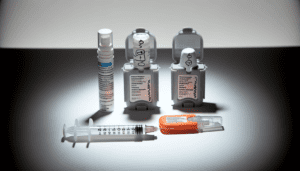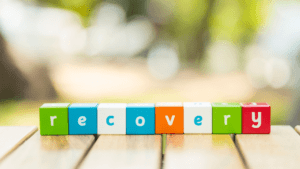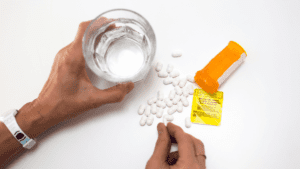Addiction recovery can feel like an uphill battle, but it’s essential to remember that it’s a journey worth taking. With the right tools and support, you can regain control of your life and enjoy the countless rewards that come with sobriety. In this blog post, we’ll guide you through powerful steps that empower your addiction recovery journey, from understanding the process to developing coping strategies for long-term resilience.
We’ll explore the importance of customized treatment plans, the role of medication, various behavioral therapies, and the significance of a supportive environment for recovery. By the end, you’ll have the knowledge and resources to face addiction head-on and create a foundation for lasting success.
Key Takeaways
- Acknowledge the need for change and commit to recovery with supportive guidance.
- Tailor addiction treatment plans and evaluate facilities for best fit.
- Build a drug free lifestyle, manage cravings & stress without drugs, learn from relapses for lasting sobriety!
Understanding the Recovery Journey
The path to addiction recovery is a journey that requires dedication and perseverance. It’s a process that involves acknowledging the need for change, committing to recovery, and sustaining sobriety through various stages. Recognizing that you have a substance use disorder and taking the courageous decision to make a change is the first step towards a rewarding recovery.
A strong sense of urgency for sobriety can greatly enhance addiction recovery. Supporters, like family and friends, can provide immense love and encouragement, particularly when mental health issues are involved. Positive influences and a robust support system significantly contribute to a successful recovery.
Loved ones should demonstrate their support by empathizing with the journey of substance misuse and ensuring the individual doesn’t feel alienated.
Acknowledging the Need for Change
Addiction can have devastating effects on a person’s life, including:
- Physical health issues
- Psychological distress
- Strained relationships
- Financial difficulties
Realizing the negative impact of addiction and the desire for a healthier life is the first step towards recovery. Self-recognition fosters self-awareness and encourages individuals to take steps towards recovery, allowing them to gain insight into their thoughts, feelings, and behaviors. This ultimately serves as a foundation for building emotional intelligence and improving overall mental health during the recovery journey.
Committing to Recovery
Commitment to change and pursuit of professional help are vital elements of successful addiction recovery. Your recovery journey may bring about diverse emotions, including:
- stress
- loneliness
- anger
- anxiety
Nonetheless, addressing the root causes of addiction is a significant step towards lasting recovery.
Support exists to guide you through meaningful conversations with your loved one about their substance use. Assistance in Recovery can provide you with an advocate who can guide you on the best way to have an effective conversation with your loved one about their substance use. Open communication and understanding can pave the way for a smoother journey towards recovery.
Sustaining Sobriety
Though maintaining sobriety requires diligence and effort, appropriate support, self-care, and lifestyle modifications can make success achievable. After completing treatment, it’s paramount to persist in your recovery efforts, concentrate on attaining future goals, and strive for a healthier future.
Abstinence plays a role in sustaining sobriety, serving as the foundation for recovery. Committing to abstain from substances not only helps prevent relapse but also allows individuals to focus on personal growth and healing. Embracing a lifestyle of abstinence means prioritizing health, making informed choices, and engaging in activities that promote well-being.
Sobriety and relapse prevention are achievable by surrounding yourself with supportive individuals, partaking in self-care activities, and staying dedicated to your goals. By cultivating an environment that reinforces your commitment to abstinence, you can build a fulfilling and sober life.
Tailoring Treatment to Individual Needs
Tailoring addiction treatment is fundamental in meeting the unique needs of each individual. A successful addiction treatment program is built on individualized treatment plans, evidence-based therapies, and a nurturing environment that encourages long-term recovery. Selecting a program that aligns with the individual and caters to their specific needs is of utmost importance.
Selecting the right addiction treatment facility may seem overwhelming, but resources like “Choosing Drug Rehab and Addiction Treatment” and treatment referral routing service can offer helpful advice and guidance. The upcoming sections will cover the procedure for assessing treatment facilities and integrating mental health care into addiction recovery.
Evaluating Treatment Facilities
When evaluating addiction treatment facilities, consider factors like:
- Evidence-based care
- Accreditation
- Licensing
- Staff expertise
- Treatment programs
- Care continuum
- Success rates
- Outcomes
- Location
- Environment
- Insurance coverage
- Cost
The location of an addiction treatment facility can have a significant impact on its effectiveness. Accessibility, the surrounding environment, and the availability of resources and support networks in the facility’s location can make a difference, providing individuals with a better chance of long-term success. Addiction Help Finder can assist individuals in locating nearby treatment centers that best suit their needs, ensuring they have access to the support and national resources essential for their recovery journey.
The average cost of addiction treatment facilities can vary widely, offering a range of treatment options to suit different budgets. When exploring different addiction treatment facilities, you can expect to find a wide range of treatment programs, including:
- Detoxification
- Counseling
- Therapy
- Aftercare support
Researching and evaluating different facilities to find one that best caters to your needs is vital for maximizing the effectiveness of your recovery journey.
Incorporating Mental Health Care
Successful addiction recovery necessitates the addressing of underlying mental health concerns. Studies show that merging mental health and addiction treatments from a single provider or team optimizes your prospects for successful recovery. Mental health concerns, such as:
- depression
- anxiety disorders
- bipolar disorder
- schizophrenia
Alcohol abuse, drug abuse, and drug addiction are often linked, forming a dangerous cycle of substance abuse.
The integration of mental illness and substance use disorder care into general medical settings has proven successful. Incorporating psychotherapy, like CBT, along with medication can aid in addressing mental health concerns during addiction recovery.
The Role of Medication in Treating Addiction
Medications can play a vital role in drug addiction treatment, including maintenance medications and medication-assisted therapy. Incorporating drug treatment can be incredibly helpful in managing withdrawal symptoms, preventing relapse, and treating any co-occurring mental health condition such as depression or anxiety.
The forthcoming sections, referencing the diagnostic and statistical manual, will elucidate the specifics of maintenance medications and medication-assisted therapy.
Maintenance Medications
Maintenance medications, such as prescription pain relievers, can serve as a potent tool in your recovery journey, aiding in the reduction of cravings and withdrawal symptoms. They act on the brain’s opioid receptors and provide a safer and controlled alternative to the addictive substance, allowing you to gradually reduce your dependence and focus on your recovery.
Maintenance medications, such as Methadone, Buprenorphine, and Naltrexone, are approved by the FDA for the treatment of opioid use disorder and can help individuals sustain recovery and prevent relapse. Naloxone is a life-saving medication used to reverse opioid overdoses in emergency situations. Available as a nasal spray (Narcan) or injection, naloxone works by rapidly binding to opioid receptors in the brain, effectively reversing the effects of the overdose. While naloxone doesn’t treat opioid addiction itself, it’s an essential tool in preventing fatal overdoses, giving individuals the chance to seek further treatment.
Medication-Assisted Therapy
Medication-assisted therapy (MAT) is an effective treatment method for addiction, blending medication with counseling and behavioral therapies. It is commonly used for opioid and alcohol addiction and works by reducing withdrawal symptoms, cravings, and the reinforcing effects of drugs, allowing individuals to focus on their recovery.
Medications used in MAT include buprenorphine, methadone, and naltrexone, which help stabilize brain chemistry, normalize body functions, and block the effects of opioids. MAT is often combined with counseling and support services to provide a comprehensive and effective approach to addiction treatment.
Behavioral Therapies: Rewiring Habits and Thoughts
Behavioral therapies are integral in addiction treatment, assisting individuals in altering attitudes and behaviors associated with addiction. Cognitive-behavioral therapy (CBT) and family therapy are two popular approaches that can help individuals understand the root causes of their addiction and develop healthier coping mechanisms.
Cognitive-Behavioral Therapy
Cognitive-behavioral therapy centers on spotting and altering negative thought patterns and behaviors linked to addiction. Through CBT, individuals can replace negative thought patterns with healthier ones, leading to positive changes in their behaviors and emotions.
This therapy enables individuals to identify and confront irrational beliefs and negative thoughts associated with addiction, thereby setting the groundwork for enduring recovery.
Family Therapy
The inclusion of family members in the recovery process can yield extra support and enhance treatment outcomes. Family therapy can help foster better communication, break down unhealthy patterns, and offer support and education to family members. It can also help uncover and address fundamental family issues that may be driving the addiction, providing a comprehensive approach to healing and recovery.
Building a Supportive Environment for Recovery
Establishing a supportive environment is key to successful addiction recovery. Support groups provide a safe space for individuals in recovery to share their experiences and receive encouragement from others facing similar challenges.
Along with participating in support groups, leading a drug-free lifestyle is crucial for sustaining sobriety and warding off relapse.
Joining Support Groups
Support groups, such as Narcotics Anonymous (NA) and Alcoholics Anonymous (AA), can provide invaluable shared experiences and strategies for maintaining sobriety. They offer a nurturing environment for individuals to share their stories and learn from others who are going through a similar journey of overcoming addiction.
Participating in support groups can give you access to valuable insights, coping strategies, and resources that can help lead to successful recovery.
Creating a Drug-Free Lifestyle
Making lifestyle changes, such as avoiding triggers and building a sober social network, can help maintain sobriety. Steer clear of people, places, or activities that might tempt you to use drugs, and surround yourself with supportive individuals who share your commitment to sobriety.
Adopting a drug-free lifestyle can help reduce the risk of relapse and keep you aligned with your recovery objectives.
Coping Strategies for Long-Term Resilience
The development of healthy coping strategies is fundamental for enduring recovery and resilience. Learning to handle cravings and manage stress without using drugs can help prevent relapse and maintain sobriety.
The upcoming sections will cover strategies for dealing with cravings and managing stress without resorting to drugs.
Handling Cravings
Strategies for managing cravings encompass distraction, conversing with someone, and contesting negative thoughts. Engaging in a distracting activity, practicing relaxation techniques, and reaching out for support can help you manage drug cravings and stay focused on your recovery goals.
The development of these coping mechanisms can equip you to conquer cravings and uphold long-term sobriety.
Managing Stress Without Drugs
Acquiring skills to manage stress via healthy outlets, like exercise or meditation, can aid in preventing relapse. Taking care of your physical and mental well-being by engaging in activities like exercise, yoga, or mindfulness can not only help you manage stress but also improve your overall health.
Embracing these healthy coping strategies can help you stay aligned with your recovery and minimize the risk of relapse.
Navigating Relapses: A Step in the Learning Process
Relapses, while common during the recovery journey, can offer insightful lessons for treatment improvement. Remember, relapse is not a sign of failure but rather a chance to learn and evolve.
Comprehending the triggers and causes of relapse can aid in modifying your treatment plan and devising fresh strategies for maintaining sobriety.
Learning from Relapse
Recognizing the triggers and reasons for relapse can assist individuals in tweaking their treatment plan and crafting new approaches for sustaining sobriety. Here are some steps to take:
- Reflect on the circumstances that led to the relapse.
- Seek support and guidance from a therapist, counselor, or support group.
- Adjust your treatment plan, if necessary, to address any gaps or areas of weakness. By taking these steps, you can empower yourself to prevent future relapses and maintain long-term sobriety.
Embrace the lessons learned from relapse to strengthen your recovery journey and build resilience.
Summary
Throughout this blog post, we’ve explored the empowering steps towards successful addiction recovery. From understanding the recovery journey and tailoring treatment to individual needs, to developing healthy coping strategies and creating a supportive environment, these steps can provide a strong foundation for lasting success.
Remember, addiction recovery is a journey, not a destination. As you continue to grow and learn, you’ll become more resilient and better equipped to handle challenges along the way. Embrace the journey and the lessons it brings, and you’ll find yourself on the path to a fulfilling, drug-free life.
Frequently Asked Questions
What are some recovery skills?
Recovery skills include identifying triggers, developing a relapse prevention plan, seeking support from family and friends, learning healthy coping mechanisms, and engaging in self-care activities. With these tools, recovery is possible!
What are healthy addictions?
Healthy addictions are habits and activities that have a positive impact on our lives, such as laughing regularly to release endorphins, reduce stress and support our immune system. They can also encourage good sleep and help us make positive changes to lead healthier lifestyles.
What is the importance of commitment in addiction recovery?
Commitment is essential for addiction recovery, as it helps to stay focused on goals and maintain sobriety. Professional help and strong support are vital for successful recovery.
How can medication-assisted therapy help in addiction recovery?
Medication-assisted therapy can be a powerful tool in addiction recovery, allowing individuals to address withdrawal symptoms, cravings and reinforcing effects of drugs while focusing on their recovery.
What is the role of family therapy in addiction recovery?
Family therapy can be a powerful tool for addiction recovery, empowering family members to address conflicts, improve communication, rebuild trust, and promote overall wellbeing.










